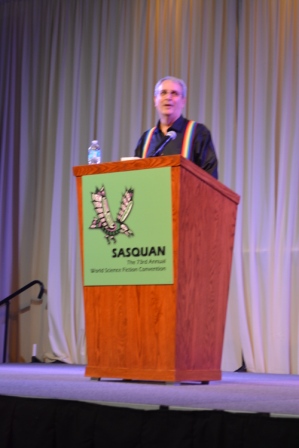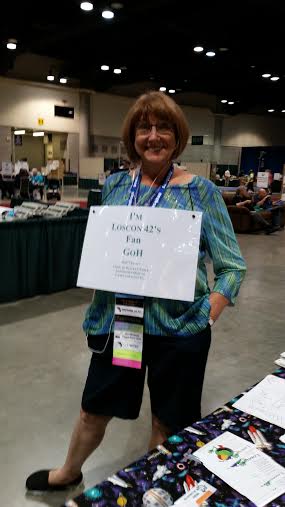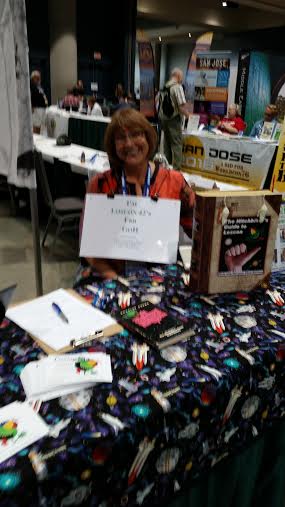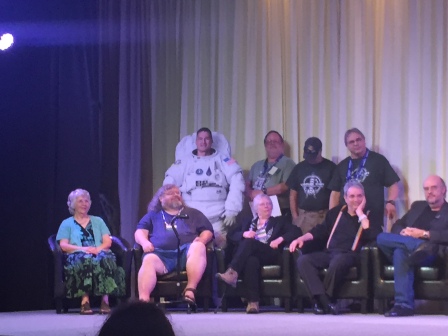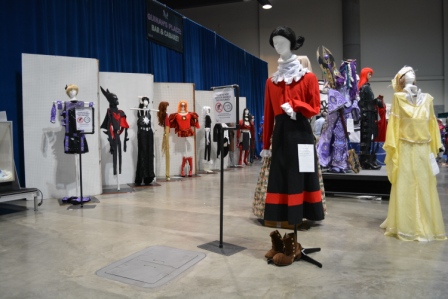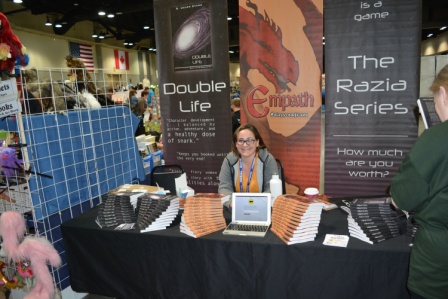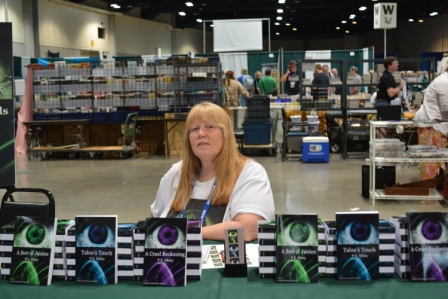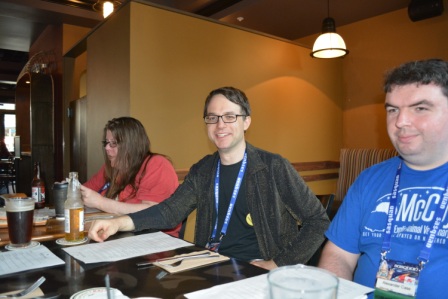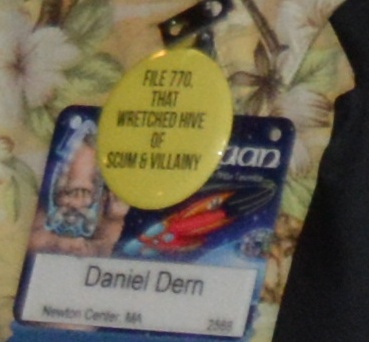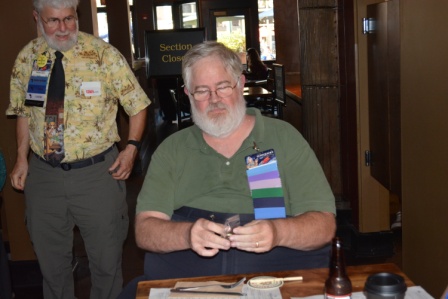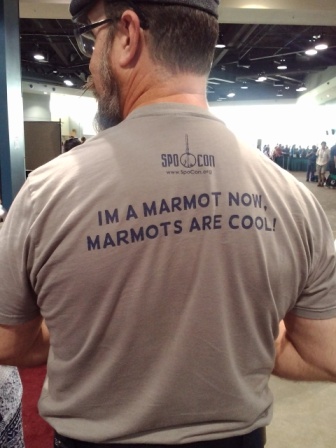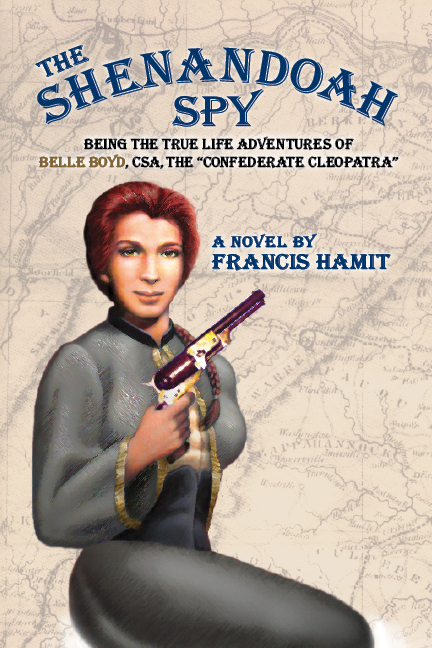(1) If you are fan who drinks, the newly reopened Clifton’s Cafeteria would like to tempt you with these two science fictional libations –
(2) “Another Word: Chinese Science Fiction and Chinese Reality” by Liu Cixin, translated by Ken Liu, in Clarkesworld, talks about the themes of other Chinese writers after these introductory comments about the domestic reception for his own work.
China is a society undergoing rapid development and transformation, where crises are present along with hopes, and opportunities coexist with challenges. This is a reality reflected in the science fiction produced there.
Chinese readers often interpret science fiction in unexpected ways. Take my Three Body series as an example. The alien-invasion story takes as its premise a “worst-case” scenario for relationships among members of the cosmic society of civilizations, which is called the “Dark Forest” state. In this state, different starfaring civilizations have no choice but to attempt to annihilate each other at the first opportunity.
After publication, the novels became surprisingly popular among those working in China’s Internet industry. They saw the “Dark Forest” state portrayed in the novels as an accurate reflection of the state of brutal competition among China’s Internet companies….
Authors (myself included) are often befuddled by such interpretations.
(3) From “’Star Wars’: Their First Time” in the New York Times.
Ridley Scott: I had done a film called “The Duellists” and was in Los Angeles to shoot at Paramount, and I honestly think Paramount had forgotten. I remember saying, I’m Ridley Scott, and they said who? So David Puttnam, one of the greatest producers I’ve ever worked with and the most fun, said, “Screw them, let’s go see [“Star Wars”] at the Chinese [theater].” It was the first week. I’ve never known audience participation like it, absolutely rocking. I felt my “Duellist” was this big [holds thumb and forefinger an inch apart], and George had done that [stretches arms out wide]. I was so inspired I wanted to shoot myself. My biggest compliment can be [to get] green with envy and really bad-tempered. That damn George, son of a bitch. I’m very competitive.
(4) Andrew Porter was interviewed, complete with photo, for “Longtime Brooklynites Reflect on a Changing Brooklyn” on Brownstoner.com:
Now you can put a face to me and my non SFnal opinions about recent changes in Brooklyn Heights, where I’ve lived for 47 years.
I’m sure you’ll also appreciate the comments, one of which accuses me of hating Brits!
(Daveinbedstuy accuses – “Andrew Porter sounds cranky; as he usually does on BHB. I wonder what he has against ‘Brits.’ And bringing up ‘granite countertops’ Really????????”)
(5) Jim C. Hines on Facebook:
I HAVE WRITTEN THE FIRST 22 WORDS OF MY NANOWRIMO NOVEL!
The NaNo word counter says at this rate, I’ll finish by January 20, 2022.
I suppose I should probably keep writing, eh?
(6) “Fantastic Worlds: Science and Fiction, 1780-1910” is on exhibit through February 26, 2017 in the newly renovated Smithsonian Libraries Exhibition Gallery of the National Museum of American History.
Travel with us to the surface of the moon, the center of the earth, and the depths of the ocean – to the fantastic worlds of fiction inspired by 19th century discovery and invention.
New frontiers of science were emerging. We took to the air, charted remote corners of the earth, and harnessed the power of steam and electricity. We began unlocking the secrets of the natural world. The growing literate middle class gave science a new and avid public audience. Writers explored the farther reaches of the new scientific landscape to craft hoaxes, satires and fictional tales.
Fantastic Worlds: Science and Fiction, 1780-1910 is accompanied by an online exhibit.
(7) Francis Hamit, a novelist and film producer who is a graduate of the Iowa Writers Workshop, has published A Perfect Spy, a memoir about his first two years at the University of Iowa when he was a dual major in Drama and Business. While he narrates the ongoing dramatic social changes that were transforming society and the university in 1965 and 1966, he also covers the impact of the sexual revolution, the sudden rise of a drug culture, and the beginnings of the anti-war movement at the University of Iowa, from a first-person perspective.
“I saw the first draft card burnt,” Hamit says; “And I would see the last anti-war riot there several years later. I was also very disturbed by the rise of all kinds of drug use in and around Iowa City. Unlike almost everyone else I knew, I did not think this ‘cool’. I saw people ruining thier lives by refusing to tell the police who’d sold them the drugs: facing years in prison. I offered to help them find the dealers if they would leave my friends alone. How I did this is narrated in A Perfect Spy, which is a 118-page excerpt from my forthcoming book Out of Step: A Memoir of the Vietnam War Years.
“I was already in place,” Hamit added; “A perfect spy who made no pretenses of approving of recreational drugs. I didn’t do anything with them, but simply watched and listened so I could collect some useful intelligence for the police. At the same time, I became involved with some very interesting women who were part of the Sexual Revolution. That was part of a larger social revolt. None of what happened then can be viewed in isolation, so I’ve just tried to be as truthful as possible while changing a lot of the names of the people to prevent embarrassment.”
A Perfect Spy will be available exclusively at first from November 12, 2015 on Amazon Kindle for $5.00 and can be pre-ordered now. A print edition will be available in March, 2016 with a suggested retail price of $12.00 from most bookstores.
(8) “The artist who visited ‘Dune’ and ‘the most important science fiction art ever created’” – a gallery of Schoenherr at Dangerous Minds.
Frank Herbert said John Schoenherr was “the only man who has ever visited Dune.” Schoenherr (1935-2010) was the artist responsible for visualising and illustrating Herbert’s Dune—firstly in the pages of Analog magazine, then in the fully illustrated edition of the classic science fiction tale. But Herbert didn’t stop there, he later added:
I can envision no more perfect visual representation of my Dune world than John Schoenherr’s careful and accurate illustrations.
High praise indeed, but truly deserved, for as Jeff Love pointed out in Omni Reboot, Schoenherr’s illustrations are “the most important science fiction art ever created.”
(9) Jason Sanford posted a collection of tweets under the heading “The fossilization of science fiction and fantasy literature”. Here are some excerpts.
https://twitter.com/jasonsanford/status/660782118356783104
https://twitter.com/jasonsanford/status/660783781654233088
https://twitter.com/jasonsanford/status/660789856075948034
Although I have friends that do exactly what Sanford complains about, he doesn’t hang with them, read their fanzines, or (I’d wager) even know their names, so I’m kind of curious whose comments sparked off this rant.
Personally, I’m prone to recommend Connie Willis or Lois McMaster Bujold if I’m trying to interest someone in sf – though both have been around over 25 years and aren’t spring chickens anymore either.
People recommend what they know and esteem. It’s perfectly fine to argue whether recommendations will win fans to the genre, but it seems petty to act as if pushing “classic” choices is a war crime.
(10) John Scalzi was more or less content with Sanford’s line of thought, and responded with “No, the Kids Aren’t Reading the Classics and Why Would They”.
Writer Jason Sanford kicked a small hornet’s nest earlier today when he discussed “the fossilization of science fiction,” as he called it, and noted that today’s kids who are getting into science fiction are doing it without “Asimov, Clarke, Heinlein and Tolkien.” This is apparently causing a moderate bit of angina in some quarters.
I think Sanford is almost entirely correct (the small quibble being that I suspect Tolkien is still common currency, thanks to recent films and video games), nor does this personally come as any particular shock. I wrote last year about the fact my daughter was notably resistant to Heinlein’s charms, not to mention the charms of other writers who I enjoyed when I was her age… thirty years ago. She has her own set of writers she loves and follows, as she should. As do all the kids her age who read.
The surprise to me is not that today’s kids have their own set of favorite authors, in genre and out of it; the surprise to me is honestly that anyone else is surprised by this.
(11) “The kids” who don’t read the classics are one case, would-be sf writers are another, explains Fynbospress in “Slogging forward, looking back” at Mad Genius Club.
Kris Rusch has also noted how many young writers she’s run into who are completely ignorant of the many, many female authors who’ve been in science fiction and fantasy since the start. Among other reasons, many of their works have gone out of print, and the new writers coming in may not have read the old magazines, or picked up the older, dated-artwork books at the used bookstores. So they really, truly, may not know that their groundbreaking new take has been done to death thirty years before they came on the scene, or that they’re trying to reinvent a wheel that has not only been invented, it’s evolved to all-wheel drive with traction control.
(12) I can’t say that Vivienne Raper is going where no one has gone before in responding to the latest Wired article about the Hugos — “Five reasons why the ‘Battle for Pop Culture’s Soul’ isn’t about ‘white men’”.
[First three of five points.]
There are many reasons why I might be “angered” by previous Hugo winners. And none of them are anything to do with ‘the increasingly multicultural makeup’ of the awards:
ONE
Science fiction’s most prestigious award‘ for Best Novel was decided in 2014 by fewer than 4,000 voters.
TWO
The Best Short Story for 2014 got onto the ballot with fewer than 43 nominations.
THREE
Popular blogger John Scalzi has won more Hugo Awards (inc. best fan writer) than Isaac Asimov – author of I, Robot – or Arthur C. Clarke. He also has 90K+ Twitter followers.
(13) Jeb Kinnison at Substrate Wars is more analytical and lands more punches in “The Death of ‘Wired’: Hugo Awards Edition”. Here are his closing paragraphs.
The various flavors of Puppies differ, but one thing they’re not is anti-diverse — there are women, people of various colors, gays (like me), religious, atheists, and on and on. The one thing they have in common is that they oppose elevating political correctness above quality of writing, originality, and story in science fiction. Many of the award winners in recent years have been lesser works elevated only because they satisfied a group of progressives who want their science fiction to reflect their desired future of group identity and victim-based politics. For them, it is part of their battle to tear down bad old patriarchy, to bury the old and bring themselves to the forefront of culture (and incidentally make a living being activists in fiction.) These people are often called “Social Justice Warriors” – they shore up their own fragile identities by thinking of themselves as noble warriors for social justice. Amy Wallace places herself with them by portraying the issues as a battle between racist, sexist white men and everyone else.
She then goes on to give some space to Larry Correia, Brad Torgerson, and Vox Day (Ted Beale). While her reporting about them is reasonably truthful, they report that she promised to interview Sarah Hoyt (who ruins the narrative as a female Puppy) but did not do so, and left out material from other interviews that did not support her slant. Tsk!
The piece is very long, but written from a position of assumed moral superiority and elite groupthink, a long fall from classic Wired‘s iconoclastic reporting. It’s sad when a quality brand goes downhill — as a longtime subscriber, I’ve noticed the magazine has grown thinner in the last year as ad revenues declined and competition from upstarts like Fast Company ate into their market. Now they are me-tooing major controversies for clicks. Once you see this dishonesty in reporting, you should never view such sources as reliable again.
(14) Sometimes I suspect AI stands for “artificial ignorance.”
File770 insiders insist Portuguese == Latino. Yo, mental midgets: take that up with the US Government.
— finger chomper (@sadrbtpuppies) November 2, 2015
If the programmer of this tweet-generating robot was literate, they could easily discover that the words Portugal and Portuguese are not even mentioned in this U.S. Census definition of “Hispanic or Latino.”
(15) “The Original Star Wars Trilogy Gets An Awesome Force Awakens-Style Trailer” via Geek Tyrant.
I’d warn that there are too many spoilers, except you’ve already seen the original trilogy how many times?
[Thanks to Andrew Porter, Mark-kitteh, Will R., JJ, Trey Palmer, Francis Hamit, and John King Tarpinian for some of these stories. Title credit goes to File 770 contributing editor of the day Jack Lint.]




